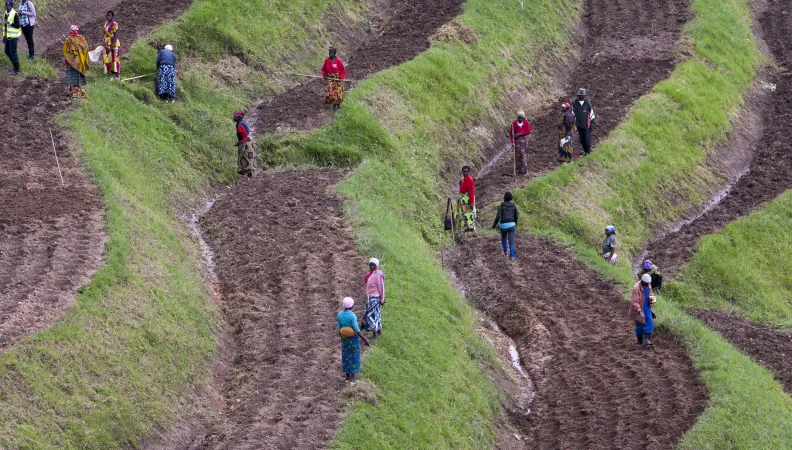Share the page
Agriculture: Nigeria’s job creation engine
Published on
Kola Masha Managing Director Babban Gona


Private Sector & Development #31 - Scaling up the development impact of agro-industry
This issue of Private Sector & Development aims to demonstrate that the agro-industry, even if it sometimes brings up “negative externalities affecting the environment and small producers”, can be a major driver for development.
Unemployed youth in Nigeria are estimated at over 60%. As this figure increases, so does the risk of insurgencies. The solution could come from agriculture; yet young smallholders face the problem of not having the economies of scale to be profitable. The Babban Gona model of grassroots mini farmer cooperatives aims to address this problem by bringing professional management and investment to scale, enabling the sector to fulfill its potential.
Today, youth unemployment in Nigeria is estimated at over 60% , raising the risk of insurgencies. Nigeria has seen a dramatic rise in these in the last two decades. With a population of over 180 million and a median age of 18, over four times more youths than previously are expected to enter the workforce in the next 20 years, highlighting the need to create jobs. The solution could come from agriculture, due to its size (22% of GDP), growth potential, high labor requirement and low level of skill required. While agriculture is a major employer, smallholders are stuck in a cycle of poverty, as they do not have the economies of scale to be profitable commercial farmers.
Cycle of Poverty, a Structural Problem
Low economies of scale represent a structural problem driving smallholder farmers’ low yields and profitability. They inhibit access to credit for purchasing the inputs needed at an affordable price as well as access to market information on optimizing yields and delaying the sale of their produce at a higher price, as product value appreciates post-harvest.
Compared with their older compatriots, young smallholder farmers face challenges that reduce their profitability. First, their farms are smaller due to succession and inheritance, forcing them to attain very high yields in order to generate enough net income to support their families. Second, older farmers have teenage children who help out on the farm and subsidize their labor costs. To compete, they have to employ labor-saving technologies or hire labor. Third, they have fewer saving and fewer assets, so they have less to invest in inputs or to offer as collateral for loans.
The Solution: Farm Cooperatives
Smallholders in other countries have met the challenge of low economies of scale by forming farmer organizations that have enabled them to attain high economies of scale. The success of farmer organizations in developed countries has hinged on committed leadership, with true accountability to fellow members; professional management; and investment to scale, to capture additional economies of scale.
Nigeria's grassroots farmer cooperatives lack professional management and investment to scale, due to the lack of formal education of their leaders. Babban Gona's model (see figure 1) aims to bring the missing professional management and investment to scale to the grassroots mini farmer cooperatives, called Trust-Groups.
A Franchise Network of Mini Farm Cooperatives
Babban-Gona (the franchisor) franchises a model for running a Trust-Group (the franchisee), comprising an average of four members, typically farming 0.7ha each. The Trust-Group receives and passes on to its members a standard set of products and services to increase their net income. Members produce key staple crops: maize, rice. To start, Babban-Gona launched a grass-roots marketing effort to encourage prospective leaders to apply. Application involves going to a testing center and interviews to assess the personality characteristics and aptitude for success as a Trust-Group leader. Once established, members of the Trust-Group are trained using the BG Farm University platform (agronomy, financial literacy, business skills and leadership). In parallel, a farm analysis is conducted on their fields to ensure that they receive a tailored agronomic program geared towards attaining optimal productivity and return on investment, while minimizing environmental impacts. The agronomic program is provided on a payment plan. Leveraging economies of scale and supply-chain efficiencies, BG ensures products and services are provided at highly competitive prices. Then, effective market access for the Trust-Groups is provided by the Enhanced Warehouse Receipt Model: a transport contactor picks up the member’s maize product on from their farm and brings it to a collection center where it is graded and weighted; the member is then provided a warehouse receipt for the quantity and grade of product delivered and the product is collateralized, enabling the farmers to get an harvest advance loan . Finally, Babban Gona sells products on behalf of farmers to premium markets.
Key challenges: a profitable and sustainable model
Given the smallholder farmers’ low purchasing power and their fragmentation, the main challenge is to make the model profitable and sustainable: enable members to achieve optimal levels of productivity, while minimizing negative impacts on the environment. Babban Gona’s core business, agro input credit and marketing services to members, allows for efficient credit delivery, aggregation and distribution of products. Over the last few years, Babban Gona has piloted several business line extensions to create a Shared Channel Distribution Model, which utilizes the rural network to deliver goods and services to communities in remote and rural areas (last mile aggregator, distributor, and retailer). These have the benefit of increasing financial sustainability of the model as well as the members' net incomes. In the last six years, Babban Gona has scaled from 100 farmers in 16 Trust Groups to 18,000 in 4,200 Trust Groups across three northern Nigerian states (Kaduna, Katsina and Kano State). The yields and net incomes members have been increased by two and three times respectively compared with the average Nigerian farmer. Babban Gona wants to go further and reach nearly 80,000 small farmers by 2020. The model has already been replicated in four hubs servicing three states, taking us on track for this ambition.
Author(s)
Kola Masha
Managing Director
Babban Gona

